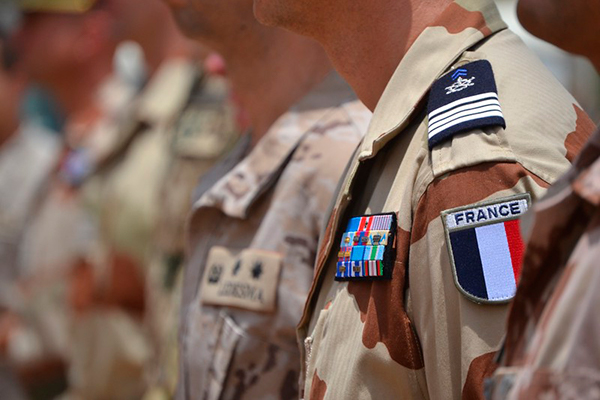Theme
The current instability in the Sahel has attracted a heavy international security presence to the region which has taken on a logic of its own. Yet there is a need to reflect on how the international presence and local power dynamics mutually shape each other to gain a more comprehensive understanding of why current efforts to stabilise the situation have fallen short.
Summary
The political underperformance, socio-economic grievances, widespread poverty and expansion of terrorist networks in the Sahel region are commonly framed as security risks to both the region itself and to Europe. The heavy international security presence in the region, including a UN peacekeeping mission with a robust mandate, a US Africa Command drone base, three EU missions, a large French-led counter-terrorist operation, and the creation of a new Special Forces Joint Task Force, support this interpretation. This paper critically reflects on how security threats are framed and looks at how the region has become a scene for the EU to strengthen its identity as a security actor and for its member states to both show commitment to multilateralism by contributing troops to EU and UN missions and to be loyal partners to larger allies such as France and the US. While this is not incompatible with the desire to increase the stability in the region, the fact that the international presence has taken on a logic of its own may render external actors less attentive to how they affect, and are affected by, local power dynamics.
Analysis
Framing security in the Sahel – for whom?
Framing challenges as security threats is a political exercise whereby certain issues become high priorities that require action. Alarmist rhetoric related to refugee and migration flows since well before 2015 has, for instance, securitised the migration issue, resulting in a number of efforts to curb migration flows from the Sahel,1 while the increased terrorist activity in the region has ensued a variety of counter-terrorism operations, in part to stabilise the region and in part for fear of it spreading to Europe through migration. Fear of increased migration has also been linked to the demographic situation in the region, which by some observers has been described as a ‘demographic timebomb’2 due to the high fertility rates in the region. Refugee flows to Europe have indeed proved to be a non-negligible political challenge to the unity and smooth functioning of the EU, as divisions between member states regarding the reception of refugees have led to heated debates over the past years. Yet the security dimension of this aspect appears to be overstated, in particular when noting that terrorist attacks in Europe between 2015 and 2019 resulted in 384 victims,3 where most of the attacks were planned and executed by homegrown terrorists,4 rendering the causal link between terrorist attacks in Europe and the Sahel region questionable at best.
This said, there is clearly a dire security situation in the region driven by, and resulting in, socio-economic and political grievances, that necessitate responses to improve the situation for the local population. For European states, however, the security risks related to the situation in the Sahel are less explicit, yet there is an obvious attraction for both external and local actors to portray the current situation in security terms. First, focusing on security aspects makes it possible to avoid uncomfortable and sensitive discussions about political governance while it is more likely that the external presence is welcomed by leaders in the region. Secondly, a focus on security enables both external and internal actors to join forces against common enemies, thereby bridging differences and at least rhetorically pushing for a common agenda. Thirdly, while the Sahel is a region where the EU has attempted to put its comprehensive approach into practice, covering diplomacy, development cooperation and the Common Security and Defence Policy (CSDP), the approach has nevertheless tilted heavily towards a security focus and a desire to showcase the EU’s identity as an international security actor.5
The Sahel as a political scene for multilateralism and partnerships
The increased international attention and interventions in the Sahel over the past decade has turned the region into a scene for external actors to showcase commitment to local partners, multilateralism and powerful allies. As ECOWAS and AU efforts to show an effective regional response by rapidly deploying a peace operation to Mali fell short,6 the UN’s peace operation, MINUSMA, has developed into a mission where African and Western troops with substantial differences in capacity and equipment cohabit somewhat uncomfortably. The political dimension of contributing troops to a UN mission is tangible in the case of MINUSMA, as European states in a break from recent tradition have contributed significant military capabilities to the mission, turning it into a symbol for a European ‘return to UN peacekeeping’.7 While it may be ‘happy accidents’ that led several European states,8 including Sweden,9 Germany and Belgium, to contribute troops to the mission ahead of the vote for a non-permanent UN Security Council (UNSC) seat, the mission remains a politically important arena for UN members to show commitment to multilateralism without taking too heavy risks in terms of security. This is due to the division of labour between African and European troops on the ground, where African troops are deployed to the most dangerous locations.10 While statistics over casualties should be analysed with care, as they are not only related to troops’ locations or the security threats faced, the fact that 190 of the 220 MINUSMA casualties are African troops in comparison to 10 European troops, gives an indication of the internal differences within the mission.11
For European states in particular, contributing troops to larger allies’ initiatives in the region has also become an important political means to show loyalty and commitment. While a collective NATO engagement in the region is unlikely to see the light, given the many bilateral and multilateral operations already underway, NATO members’ support for French initiatives should be interpreted as a means to reinforce solidarity between member states. US, Danish, Estonian and British support to the French-led operation Barkhane in the shape of troops, equipment and logistics is a case in point here.12 Macron’s call for the Europeanisation of the fight against terrorism in the Sahel has more recently been exemplified by the call for partner nations to support a French-led joint Special Task Force called Takuba in the region.13 While the new initiative has received a lukewarm response from EU member states, it is another platform for European states to back up France, improve European interoperability and add broader legitimacy to French initiatives in the region.
The less than enthusiastic support for Takuba is likely to, in part, be driven by a reluctance to collaborate with a former colonial power whose presence in the region is contested.14 In part, it may be the result of EU member states already contributing to the numerous different EU initiatives that are underway in the region. The region has become a strategic priority for the EU, with three EU Common Security and Defence Policy (CSDP) missions, four EU delegations, an EU Special Representative, a Regional Advisory and Coordination Cell, as well as a small Frontex presence in the region, all under a 2015-20 regional action plan with the aim to complement the 2011 Sahel strategy. The latter is to be renewed in the coming weeks, which opens up questions of how much a strategy –which is coming in the midst of a multitude of ongoing operations and initiatives– can distance itself sufficiently from immediate emergencies on the ground to have a coherent long-term vision.15 The development of a new strategy points, nevertheless, to the EU’s intention of a long-term commitment to the region. Indeed, the EU’s engagement in the Sahel has been seen as an attempt to construct and confirm the Union’s ability to act as a global security actor.16 So far, however, there is a risk that instead of viewing the EU’s many different initiatives as an impressive range of the Union’s capacities, it is seen as a fragmented actor where overlaps, duplications and turf battles are more defining than the actual work being done on the ground.
Playing into local dynamics
The various counter-terrorism operations, capacity-building programmes, governance and development support schemes initiated by foreign actors do not take place in a political vacuum but are playing into local dynamics. Local actors are actively shaping, reforming and at times resisting the presence, processes and practices initiated by external actors. This illustrates a complex picture where on the one hand regional leaders may welcome the international focus on security issues as it relieves pressure from much-needed political reforms,17 while on the other hand the heavy external footprints infringe on national sovereignty issues, at times resulting in resistance from local actors to be advised, guided or trained by foreigners who may have limited knowledge about local realities.18
Keeping up with the dynamics on the local level is nevertheless imperative for both foreign and national actors to have an actual influence on the overall security situation. The current security threats in Mali, for example, are highly diverse in character and need to be analysed and approached from different perspectives. The agricultural conflicts in central Mali cannot be seen through the same counter-terrorism lens that is applied to understand the situation in the north of the country, while the south faces its own distinctive challenges. This means that it is not enough to focus on how jihadist movements expand, merge and exploit local grievances to form broader alliances, but also to recognise the role that populist rhetoric, an absent, or worse, brutal security sector feed into recruitment strategies and local grievances.19 Linked to the interplay between state security forces and the expansion of terrorist networks, research has shown that human rights abuses by state security forces are a prominent accelerator of recruitment to extremist groups,20 making it particularly important to condemn, control and eradicate such practices. This also means that external security actors both need to carefully scan their own behaviour and pay attention to those with whom they collaborate.
As politically uncomfortable as it may be, the EUTM should invest more effort into the advisory task force, focusing on filling the few positions that it actually has with competent personnel, rather than leaving it half empty. This requires a buy-in from EU member states to lend out their own assets. This might be difficult, yet the fact that it would render the EUTM more relevant should weigh in favour of a collaborative approach. The recent expansion of the EUTMs mandate to allow for mentoring troops is a welcome development in this regard, as it shows commitment to the local forces, while at the same time ensuring better absorption of the training and providing a more pragmatic check on abuses against civilians,21 which theoretical conditionalities are unlikely to match.
The military coup in Mali in August, following months of protests, became an important reminder of how local political power contestations continue in spite of a heavy external presence. While some observers lamented the lack of intervention (and prevention) of the coup by foreign actors, an externally propped-up government would lose the little that was left of its legitimacy and increase popular resistance against external actors. Instead, the bloodless coup and the popularity with which it was received by the population merited a soft acceptance by the international community,22 which rapidly decided to see the coup as an opportunity to start anew rather than a reason to suspend collaboration. This might be the most pragmatic approach to the current situation, yet it also sends a signal to local leaders that external actors are staying in the region regardless of how the political and security situation evolve. This also implies that, on the one hand, any type of conditionalities imposed on local actors are likely to not be taken very seriously,23 and on the other hand, that the external presence has taken on a logic of its own.
Conclusions
The situation in the Sahel is extremely complex, in part due to the number of different types of crises existing in parallel and in part due the wide range of different actors involved. Long-term local conflicts resulting from food insecurity and poverty co-exist with expanding extremist networks and the multiplication of criminal gangs in a deteriorating socio-economic environment where state institutions are failing to deliver. Coupled with a worsening security situation characterised by an important increase in the targeting of civilians, in spite of a heavy external presence, there is reason for both external and internal actors to rethink current strategies and objectives.
Asking for a stronger political will, better governance and more coordination is an often-repeated mantra by external actors. Yet the sheer number of coalitions and initiatives aimed at improving coordination and collaboration in the region, including the Sahel Alliance, the Partnership for Security and Stability in the Sahel (P3S) and the Coalition for the Sahel, seems to make clear that very few actors –whether local or external– are willing to be coordinated. Any new externally initiated coordination platform will thus not improve the situation on the ground, but rather increase the confusion, bureaucracy and risk of duplicating efforts.24 If anything, more effort should be put into clearer task division, smoother and faster decision-making and improved management of the existing initiatives to avoid turf battles and repetition.
As the EU drafts its new Sahel strategy, it should pay attention to how the external presence influences local power dynamics in the region. The state centric approach of external actors is, for example, likely to strengthen the governments in power and thereby alleviate pressure for more substantial reform. Yet the recent Mali coup made it clear that while the pressure may be lessened, it does not disappear, and failure to respond to it will expose the false security given by the external presence. In particular, the coup in Mali, and international actors’ willingness to quickly acquiesce to the new situation, demonstrates that external actors are committed to stay for the long term, to address security concerns in the region, but importantly also to showcase support for multilateralism and loyalty to larger allies.25
Nina Wilén
Director of the Africa Programme at the Egmont Institute and Assistant Professor at Lund University | @WilenNina
1 Johannes Claes & Anna Schmauder (2020), ‘When the dust settles. Economic and governance repercussions of migration policies in Niger’s north’, Clingendael Research Unit Report, October.
2 Laurence Caramel (2017), ‘Le Sahel est une bombe démographique’, Le monde, 16/I/2017.
3 European Union Terrorism Situation and Trend Report (TE-SAT) 2020, 23/VI/2020.
4 Thomas Renard (2017), ‘Europe’s “new” jihad: homegrown, leaderless, virtual’, Egmont Security Policy Brief, nr 89, July.
5 Tuomas Iso-Markku & Teemu Tammikko (2020), ‘The EU’s role and policies in the Sahel: the need for reassessment’, Finnish Institute of International Affairs (FIFA) Briefing Paper, nr 290, 28/IX/2020.
6 Thomas G. Weiss & Martin Welz (2014), ‘The UN and the African Union in Mali and beyond: a shotgun wedding?’, International Affairs, vol. 90, nr 4, p. 889-905.
7 John Karlsrud & Adam C Smith (2015), ‘Europe’s return to UN peacekeeping in Africa? Lessons from Mali’, Providing for Peacekeeping, nr 11, International Peace Institute, July.
8 Joachim A Koops (2016), ‘Germany and United Nations peacekeeping: the cautiously evolving contributor’, International Peacekeeping, vol. 23, nr 5, p. 652-680.
9 Claes Nilsson & Kristina Zetterlund (2016), ‘Sweden and the UN: a rekindled partnership for peacekeeping?’, International Peacekeeping, vol. 23, nr 5, p. 762-783.
10 Signe Cold-Ravnkilde, Peter Albrecht & Rikke Haugegaard (2017), ‘Friction and inequality among peacekeepers in Mali’, RUSI Journal, vol. 162, nr 2, p. 34-42.
11 United Nations Peacekeeping (2020), ‘Fatalities’ (last access 12/X/2020).
12 The Defense Post (2019), ‘France seeks international support for Sahel military coalition’, 3/X/2019.
13 Rym Momtaz (2020), ‘Macron wants greater European involvement in Sahel counterterrorism’, Politico, 30/VI/2020.
14 Alexandra Reza (2020), ‘Why are French soldiers in the Sahel? Protesters have an answer’, The Guardian, 20/II/2020.
15 Anna Schmauder, Guillaume Soto-Mayor & Delina Goxho (2020), ‘Strategic missteps: learning from a failed EU Sahel strategy’, Istituto per gli studi di politica internazionale (ISPI), 5/XI/2020.
16 Signe Marie Cold-Ravnkilde & Christine Nissen (2020), ‘Schizophrenic agendas in the EU’s external actions in Mali’, International Affairs, vol. 96, nr 4, p. 935-953.
17 Denis Tull (2019), ‘Rebuilding Mali’s army: the dissonant relationship between Mali and its international partners’, International Affairs, vol. 95, nr 2, p.405-422.
18 Nina Wilén & Pierre Dehaene (2020), ‘Challenges with security force assistance in Niger: understanding local context and aligning Interests’, Observatoire Boutros-Ghali du Maintien de la Paix, 30/VII/2020.
19 Clionadh Raleigh, Héni Nsaibia & Caitriona Dowd (2020), ‘The Sahel crisis since 2012’, African Affairs, Briefing, 26/VII/2020.
20 UNDP (2017), ‘Journey to extremism in Africa: drivers, incentives and the tipping point for recruitment’, New York.
21 Andrew Lebovich (2020), ‘Disorder from chaos: why Europeans fail to promote stability in the Sahel’, European Council on Foreign Relations, 26/VIII/2020.
22 Alex Thurston (2020), ‘The international community’s soft acceptance of the coup in Mali’, International Peace Institute’s Global Observatory, 3/IX/2020.
23 Denis M. Tull (2020), ‘German and international crisis management in the Sahel’, German Institute for International and Security Affairs (SWP), nr 27, June.
24 Louise Wiuff Moe (2020), ‘The dark side of institutional collaboration: how peacekeeping-counterterrorism convergences weaken the protection of civilians in Mali’, International Peacekeeping, 14/X/2020.
25 The author would like to thank Sven Biscop, Bruno Charbonneau, Délina Goxho and Bart Laurent for helpful comments on an earlier draft.



